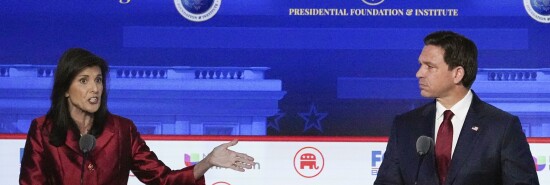
Fourth Republican debate: Presidential hopefuls should be environmental champions
Danielle Butcher Franz
Video Embed
At the last presidential debate, former U.N. Ambassador Nikki Haley criticized Gov. Ron DeSantis (R-FL), labeling him as “liberal on the environment” for his stance against fracking in Everglades National Park. The fourth debate, hosted in Tuscaloosa, Alabama, presents an opportunity for candidates to assert that environmental stewardship is, in fact, an inherently conservative value.
On Wednesday night, the four qualifying candidates will address a myriad of issues, with the economy and inflation understandably at the forefront of voters’ minds. Recent polling, however, indicates that environmental protection is gaining ground in voters’ priorities. A survey by the Economist and YouGov revealed that climate change is the third most important issue among all voters, trailing only inflation and healthcare.
KYRSTEN SINEMA ACCUSED IN ETHICS COMPLAINT OF ‘ONGOING FAILURE’ TO REPORT FINANCES
While “climate change” might not be the top concern for Alabama voters, the desire for clean air, water, and a healthy environment is universal. Alabama itself has faced extreme weather events, including Hurricane Sally, jeopardizing these fundamental environmental needs.
Prioritizing resilience in the face of extreme weather and implementing solutions to reduce greenhouse gas emissions should be a shared goal. Republican presidential candidates must communicate that a strong, America-first energy and climate strategy can yield positive results.
Ceding the environmental narrative to progressives is not a viable strategy for the conservative movement. Ignoring or dismissing environmental issues not only hinders political success but also jeopardizes our environment. Historical evidence demonstrates that top-down, bureaucratic solutions are not the answer; instead, leveraging market forces and local knowledge has proven more effective. Presidential hopefuls and party leaders alike must recognize this fact.
Consider the American bison, for example. In the late 19th century, the American bison population had dwindled to a dangerously low number due to overhunting and habitat loss. Rather than allowing this American icon to face extinction, a few dedicated individuals took it upon themselves to conserve the remaining population. Their efforts, exemplified by figures such as Ted Turner, continue to this day. Although the bison population remains threatened, private conservationists have played a pivotal role in its recovery.
Moreover, some may remember the failed Waxman-Markey bill of 2009 that would have established a cap-and-trade system for emissions. Despite this bill not passing in Congress, the United States has exceeded the emissions reduction goals laid out in the bill. Why? Energy innovation in the form of transitioning from coal to natural gas drove down domestic emissions. Rather than leading with government, the United States led with market forces.
CLICK HERE TO READ MORE FROM THE WASHINGTON EXAMINER
Conservation and environmental stewardship are inherently conservative values. The goal of passing down natural resources in better condition than we received them should be a conservative ideal. Refusing to frack the Everglades or conserving bison populations on private land is not a “liberal” stance; it is, in fact, a deeply conservative approach.
On Wednesday night, Republican presidential hopefuls should draw on the conservative movement’s historical commitment to environmental protection. It is our responsibility to leave a robust conservation legacy for our children and grandchildren, embodying the core values of conservatism. By embracing environmental stewardship, the conservative movement can forge a brighter future, grounded in principles that resonate across party lines.
Danielle Butcher Franz is the CEO of the American Conservation Coalition. Follow her on X @DanielleBFranz.
